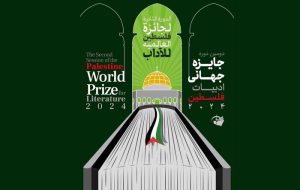Palestine World Prize for Literature receives submissions from 26 countries
TEHRAN- The 2nd edition of the Palestine World Prize for Literature has received submissions from 26 countries, the secretary of the event has announced. A total of 345 book titles from 26 countries have been submitted to the prize’s secretariat in Tehran, Mohsen Parviz said, Mehr reported on Saturday. Regarding the selection process for the


TEHRAN- The 2nd edition of the Palestine World Prize for Literature has received submissions from 26 countries, the secretary of the event has announced.
A total of 345 book titles from 26 countries have been submitted to the prize’s secretariat in Tehran, Mohsen Parviz said, Mehr reported on Saturday.
Regarding the selection process for the submitted works, Parviz explained that the award’s scientific council approves judges who then review the submissions. “However, for the Palestine World Prize, we do not have a scientific council. Consequently, the Policy Council, responsible for major policies and scientific matters regarding the prize, serves in that capacity and appoints judges from various countries,” he said.
Parviz noted that judges for the second edition of the award were selected from Syria, Lebanon, Algeria, Palestine, Iraq, Yemen, Indonesia, India, and Iran. The initial review of submissions was conducted by two judges, and those that qualified for the next stage were subsequently discussed in a joint meeting with the head of the jury.
He elaborated, “The process has been consistent across all subcategories; judges provided their reasoning for selecting works based on technique and content. The final decision was made collectively by the judges, the head of the jury, and the scientific secretary. Except for two categories with fewer submissions, five works were chosen for final evaluation and ranking.”
Parviz emphasized that the primary languages of submitted works were Arabic and Persian, thus leveraging distinguished Arabic-speaking scholars from various Arab countries for this task.
“While the majority of submissions were in Arabic and Persian, there were also entries in English, Urdu, Malay, French, and Spanish.”
Continuing, he stated, “The judging sessions for this award were conducted remotely using new technologies, setting a suitable precedent for future years, as it proved to be an efficient and successful method.”
Six judging groups were formed in six different categories: plays, memoirs, short stories, children’s literature, poetry, and novels. The highest volume of submissions came from the novel category, which received 106 entries, while the play category had the fewest, with only nine submissions, he noted.
He further mentioned that final judges included professors from Iranian universities and language faculties. Additionally, the heads of Arab Writers Union in Syria and Algeria, Muhammad Al-Hourani and Youssef Shakra, assisted in the final judging process.
Parviz affirmed that, despite the uncertainty surrounding which works will be selected, the mere focus on the theme of resistance and Palestine by writers and poets from various countries is of significant importance and a positive takeaway.
He expressed hope that through effective media promotion, the selected works could be translated into other languages and serve as advocates for the accurately and artistically rendered narratives defending the Palestinian people.
“Despite a smaller volume of submissions being reviewed over a longer period last time, the quality of works in this edition seems significantly higher,” he remarked.
“Previous memoir submissions were also strong, but we are now witnessing a remarkable leap in the quality of novels and short stories. This advancement led to some hesitation in eliminating certain works to reach a final verdict, largely influenced by the recent events surrounding the Al-Aqsa Storm.”
“The impact of Palestinian heroism on writers and poets will undoubtedly yield even higher quality works in the coming years,” he mentioned.
It has been decided that the closing ceremony of the second edition of the Palestine World Prize for Literature will be held on Monday in Baghdad, Iraq hosted by the Iraqi Prime Minister’s Office, he concluded.
The Palestine World Prize for Literature was established in 2018 in Iran by a collective decision of cultural organizations, writers’ unions, and publications from various countries. This biennial award aims to recognize the best works published about Palestine. The first edition of this prize was held in 2022 in Beirut.
SAB/
